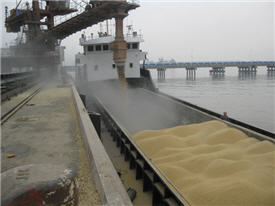The development
In the month of August 2014, 75 containers, totaling 1,313.3 tons of genetically modified (GM) yellow corn originated from the United States have been rejected and shipped back under the full instruction of the local PRC customs officer. In addition to this quantity, about 1.4 million metric tons of US corn shipments have been rejected by China since mid-November 2013.
The background
According to the latest public notice promulgated in 2012 by Ministry of Agriculture of P. R. China, a total of 19 GM agricultural products have been approved for imports and 8 of them are corn. But "Agrisure Viptera" (Coded MIR 162) - a strain of corn developed for insect resistance - is not in the list.
The manufacturer has submitted applications to the Chinese government for approval of MIR 162 several times since 2010 and although MIR 162 has been approved by most major markets including US and European Union, the application is still under Chinese government's review.
Link to the previous advice on the PRC approach to GM cargoes may be found on the right hand side.
The legal position
The Regulations on Administration of Agricultural Genetically Modified Organisms Safety states the following provisions (freely translated):
Article 33
Any company outside the territory of China that exports to the People's Republic of China agricultural genetically modified organisms to be used as raw materials for processing shall make an application to the competent agricultural administrative department of the State Council; for those meeting the following conditions and passing the safety evaluation, the competent agricultural administrative department of the State Council shall issue a safety certificate of agricultural genetically modified organisms.
Article 34
When introducing agricultural genetically modified organisms from outside the territory of the People's Republic of China or exporting agricultural genetically modified organisms to the People's Republic of China, the introducing unit or the company outside the territory of China shall make a declaration for inspection and quarantine to the exit-entry inspection and quarantine agency at the port on the strength of the safety certificate of agricultural genetically modified organisms issued by the competent agricultural administrative department of the State Council and the relevant documents of approval. Only for those passing the quarantine an application may be made to the Customs for going through relevant formalities.
Article 38
Agricultural genetically modified organisms that are imported without a safety certificate of agricultural genetically modified organisms issued by the competent agricultural administrative department of the State Council and the relevant documents of approval, or not conforming to the certificate or the documents of approval, shall be rejected or destroyed. Where agricultural genetically modified organisms to be imported are not labeled as required, the goods cannot enter the territory of China until being re-labeled.
As Chinese government has yet to approve MIR 162, theoretically it is not possible to get the "safety certificate of agricultural genetically modified organisms" as required by Article 33.
Until the official approval is in place exporters and importers take the risk of whether or not the Chinese government will approve MIR 162 before their shipment arrives in China.
Practical issues and possible disputes
In other cases, as MIR 162 corn has been widely planted in US, it can happen that small amount of MIR 162 corns are mixed up with non-MIR 162 corn at some stage during the transportation or storage.
As China adopts zero tolerance attitude toward MIR 162 GM cargos, even if only trace levels of MIR 162 were detected, those shipments will be detained or even rejected.
This may cause the following consequences to parties involved, including potential disputes involving:
- demurrage/ detention
- additional freight costs
- trans-shipment or diversion costs
- cargo claims, particularly deterioration due to long voyages
- detention or even arrest of the ship
Loss prevention advice
In order to prevent shipowners and charterers from suffering losses due to the shipper / voyage charterers' loading MIR 162 cargos, the following loss prevention advices are recommended:
- Require the shipper/ voyage charterers to provide GMO certificates prior to loading.
- Get cargo samples tested well in advance prior to the vessel's arrival at the discharge port.
- Put a warranty clause in the charterparty regarding the GMO content, so that there is a clear contractual responsibility for all consequences if traces of MIR 162 are found in the cargo at the discharge port.
Should a member's vessel find it is delayed or under investigation in a Chinese port due to traces of MIR 162 in the cargo, members are urged to contact the Association as soon as possible for further assistance.

Grain cargo operation in China (Picture courtesy of Andrew Moore & Associates)